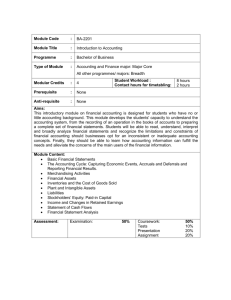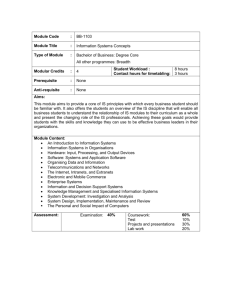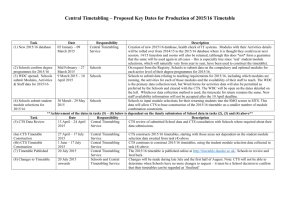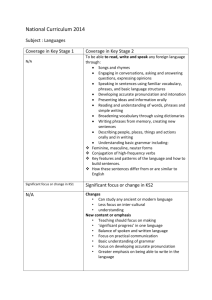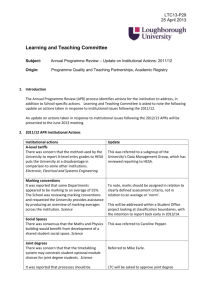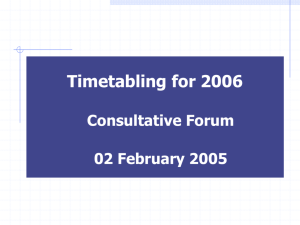Class Timetabling Procedures
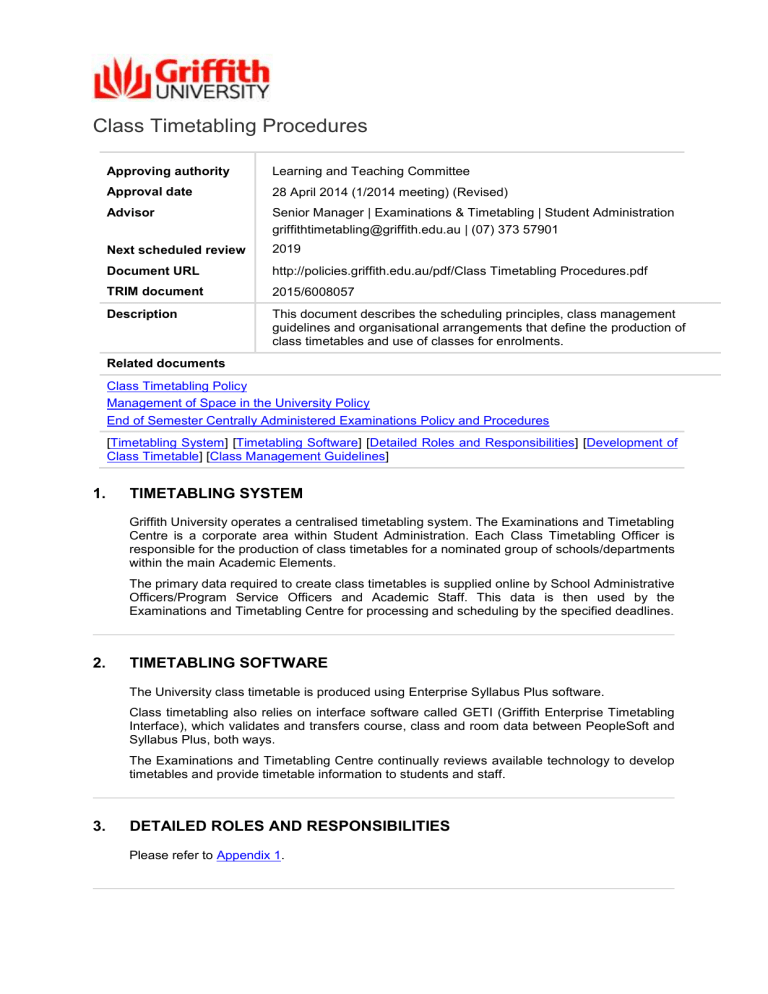
Class Timetabling Procedures
Approving authority
Approval date
Advisor
Learning and Teaching Committee
28 April 2014 (1/2014 meeting) (Revised)
Senior Manager | Examinations & Timetabling | Student Administration griffithtimetabling@griffith.edu.au | (07) 373 57901
2019 Next scheduled review
Document URL
TRIM document
Description http://policies.griffith.edu.au/pdf/Class Timetabling Procedures.pdf
2015/6008057
This document describes the scheduling principles, class management guidelines and organisational arrangements that define the production of class timetables and use of classes for enrolments.
Related documents
Class Timetabling Policy
Management of Space in the University Policy
End of Semester Centrally Administered Examinations Policy and Procedures
[ Timetabling System ] [ Timetabling Software ] [ Detailed Roles and Responsibilities
1. TIMETABLING SYSTEM
Griffith University operates a centralised timetabling system. The Examinations and Timetabling
Centre is a corporate area within Student Administration. Each Class Timetabling Officer is responsible for the production of class timetables for a nominated group of schools/departments within the main Academic Elements.
The primary data required to create class timetables is supplied online by School Administrative
Officers/Program Service Officers and Academic Staff. This data is then used by the
Examinations and Timetabling Centre for processing and scheduling by the specified deadlines.
2. TIMETABLING SOFTWARE
The University class timetable is produced using Enterprise Syllabus Plus software.
Class timetabling also relies on interface software called GETI (Griffith Enterprise Timetabling
Interface), which validates and transfers course, class and room data between PeopleSoft and
Syllabus Plus, both ways.
The Examinations and Timetabling Centre continually reviews available technology to develop timetables and provide timetable information to students and staff.
3. DETAILED ROLES AND RESPONSIBILITIES
4. DEVELOPMENT OF CLASS TIMETABLE
4.1 Class Naming Conventions
The following naming conventions are recognised as valid course components:
Computer Lab (CLB)
Common Time (CTM)
Exam (EXM)
Field Studies (FLD)
Instrument (INT)
Laboratory (LAB)
Lecture (LEC)
Online Session (ONL)
Pass Session (PAS)
Practicum (PRA)
Quiz (QUZ)
Screen (SCR)
Seminar (SEM)
Studio (STU)
Tutorial (TUT)
Workshop (WSP)
Course timetabled activities will only fall within the above recognised components. It is recommended that the delivery structure of the same course across different campuses includes the same course components.
4.2 Scheduling Constraints
Scheduling is prioritised to accommodate the needs of large 1st year classes and research intensive staff. The following scheduling constraints will normally be taken into consideration with the production of a semester timetable:
clash rules derived from program structures provided by Schools/Departments
staff availability
- a 'floating' teaching free day per week will be allocated to all Academic Staff.
- additional research and outside of Griffith commitments as per Heads of School approval
- availability of staff to teach
- inter campus travel constraints
- designated school/committee meeting times based on the following:
meetings must commence and finish on the hour
meeting preferences must not exceed 2 hours in duration. Other requirements are to be made ad hoc on a needs basis working around teaching if necessary
- late night and immediate early morning teaching will be avoided where possible
course delivery
- type and number of classes required
- required facilities, ie. required and preferred venues, AV equipment etc.
- course start and end date, ie. regular courses/dynamically dated courses
classes will be scheduled into venues on the home campus of the course unless requested otherwise. All requests to schedule classes on a different campus will be considered by the Manager, Timetabling and Room Bookings and will only be permitted if space is available. mode of teaching, ie. Day/Night
teaching requirements [eg. all classes on the same day, sequencing of classes, early in the week teaching only etc.]
- priority will be given to sequencing of classes that belong to 1st year courses
estimated enrolments
travel time - to be allowed between campuses for programs that include cross campus teaching and staff that are involved in cross campus teaching.
class allocation constraints
other staff and student constraints such as maximum span of hours per day, maximum hours per day and maximum hours to be followed by a break – to be applied where possible
A school/department may request same-time and/or co-sharing of a common location for activities of individual or related courses.
Scheduling constraints that fall outside of the above regulations will be considered by the
Manager, Timetabling and Room Bookings. If resolution is not achieved, a decision will be made by the Senior Manager, Examinations and Timetabling and in consultation with the
Director, Student Administration.
4.3 Scheduling Order
Scheduling occurs in the following priority order:
laboratory classes that require specialist space
priority classes - for example, classes with a duration which exceeds 4 hours, Saturday and Sunday classes, classes outside of regular 1-13 weeks etc.
English Language Enhancement Course (ELEC) classes and videoconferencing classes
night and day lectures - first schedule 1st year lectures by class size, then other years by class size
other classes - scheduled by the level of scheduling complexity and number of repeat activities
Sequencing of classes will be taken into consideration where possible. This includes instances where eg. tutorials are required to follow lectures, workshops are required to be scheduled after laboratory classes but before lectures etc. Priority will be given to sequencing of classes that belong to 1st year courses.
5. CLASS MANAGEMENT GUIDELINES
Classes are scheduled initially in Syllabus Plus, prior to being created in PeopleSoft for configuration and subsequent publication on the Programs and Courses website. Students then enrol in one class number for each course component.
5.1 Class configuration for enrolment
Once classes have been created in PeopleSoft, the Academic Elements undertake a class configuration process for enrolments. This consists of:
Class status configuration – to be completed prior to timetable release to students
Configuration of enrolment limits - to be completed prior to timetable release to students
A key decision-maker must be available throughout this process for each Academic
Element to ensure classes are configured in accordance with the procedures and timelines provided by Examinations and Timetabling. Classes shall not continue to be configured once students have viewed their timetable and/or started planning for enrolment.
Classes must be set up in a way that gives equal opportunity to all students and regardless of their program or whether they are continuing/commencing or domestic/international.
Sufficient places must be made available for students who need to enrol. At least 80% of classes must be open, and available for students to plan and enrol in, at the date of opening of the student planning for enrolment period. This estimate of number of classes required should be based on the previous year’s enrolment patterns. Classes must not be opened up gradually.
5.2 Class management during open enrolment
A key decision-maker must be available during the planning and enrolment period for monitoring enrolment patterns within classes and managing class demand for each school/department. In addition, reliable cover must be provided at all times during this period. The decision-maker must be responsive to increases in demand, and open up new classes where required.
Examinations and Timetabling staff will assist Academic Elements by constantly monitoring class enrolments and full courses, and advising of any enrolment problems.
The following escalation plan will be in place during the peak enrolment period:
Courses that appear on the full course report for three days
It is recommended that Timetabling staff escalate these courses to the relevant Head of School/Department and request that immediate action is taken by that area. This action may include increasing the enrolment capacity of classes, releasing any hidden classes or scheduling additional classes.
Courses that are requested to remain full
On some occasions, it may be appropriate for an Academic Element to decide that a full course will have no further places made available for enrolment. It is recommended that Timetabling staff seek permission from the relevant Head of School/Department for all courses that are requested to remain full. If not approved, additional places must be made available in the course.
Over-enrolments are not encouraged. Exceeding the room capacity should only ever be used if the set enrolment capacity is preventing student enrolments. The allowed amount of discretion is up to 10% over the room capacity. For Computer Labs and Technical
Space, class enrolments will remain at the room capacity.
Academic Elements shall contact the relevant Timetabling staff as soon as an overenrolment issue is identified to request a change of venue or schedule an additional class.
Academic Elements are asked to cooperate with venue swaps to accommodate overenrolled classes.
Excessive over-enrolments in any teaching space will be treated as an issue for the school/department in question.
Additional full class and timetabling information that students cannot readily access via the web timetable should be listed on the Full Class and Additional Timetabling Information page at www.griffith.edu.au/timetable or using the course instant messaging information. This can be requested through Timetabling staff.
APPENDIX 1: DETAILED ROLES AND RESPONSIBILITIES
Role / Responsibility
Assume the responsibility for online data collection for class timetabling, including
Programs of Study, School Meetings, Staff
Availability to Teach and Course
Timetabling Requirements.
Assist the School Administrative
Officer/Program Services Officer with online data collection as appropriate.
Approve Staff Availability to Teach submissions for their school/department.
Assist timetabling staff with timetable clashes and provide program advice.
Assume ultimate responsibility for resolving timetable clashes, which arise from school/department timetabling decisions.
Produce class timetables for the activities that are held in technical space.
Communicate the lab timetabling requirements to Examinations and
Timetabling.
Approve timetabling changes once the timetable is published.
Attend to reported enquiries related to timetabling and room bookings in a prompt and timely manner, and ensure all efforts are made to deliver best timetabling outcomes.
School
Administrative
Officer /
Program
Services
Officer
X
X
Academic
Staff
X
Head of
Academic
Element or
Delegate
Technical
Staff
Class
Timetabling
Officers
X
X
X
X
X
Examinations and
Timetabling
Management
Campus
Life
Client
Technology
Services
Students
Role / Responsibility
Liaise with Academic Elements, Campus
Life and Client Technology Services regarding timetabling and room bookings matters, including the administration of related deadlines.
Understand and coordinate the timetable process from an institutional perspective to provide a fair and equitable timetable for stakeholders and clients.
Conduct scheduling of the timetable with the aim of achieving optimal utilisation of teaching space and creating a win-win situation for all parties involved.
Coordinate and allocate teaching space and resources in accordance with
University policy and with the aim of achieving optimal utilisation of teaching space.
Ensure teaching spaces are appropriately furnished and maintained.
Carry out regular audits for the purpose of room maintenance, capacity and furniture requirements. Communicate timely any changes to the Examinations and
Timetabling.
Carry out room usage audits at least once each semester and circulate findings to all appropriate parties.
Attend to reports from staff of any problems associated with common use teaching
School
Administrative
Officer /
Program
Services
Officer
Academic
Staff
Head of
Academic
Element or
Delegate
Technical
Staff
Class
Timetabling
Officers
Examinations and
Timetabling
Management
Campus
Life
Client
Technology
Services
Students
X
X
X
X
X
X
X
X
Role / Responsibility venues, such as furniture, whiteboards, cleaning, damage, equipment or misuse.
Support and maintain centrally provided audio visual equipment in all common use teaching venues.
Liaise with the Examinations & Timetabling
Centre to ensure room data in Syllabus
Plus is kept current at all times.
Regularly check the online timetable for any class changes.
School
Administrative
Officer /
Program
Services
Officer
Academic
Staff
Head of
Academic
Element or
Delegate
Technical
Staff
Class
Timetabling
Officers
Examinations and
Timetabling
Management
Campus
Life
Client
Technology
Services
Students
X
X
X
X
